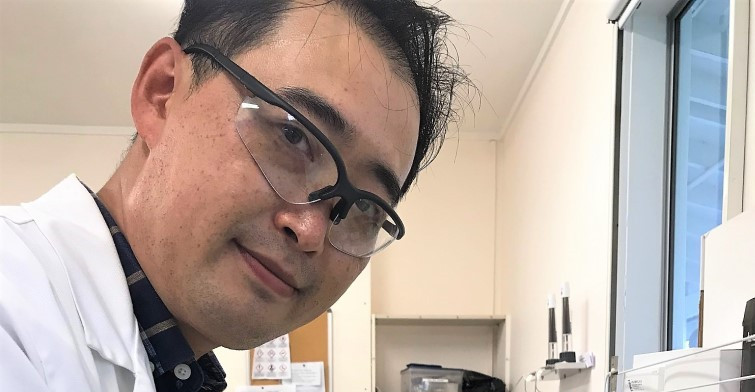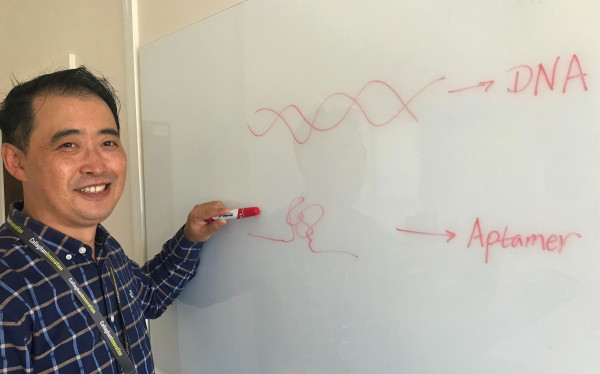
Dr Peter Li
Simple new 'spit and swab' test for Covid-19
PCR and RAT tests can tell you that you’re infected with Covid-19, but SfTI researcher Dr Peter Li’s working on a saliva test that can tell in minutes whether it’s Delta, Omicron or another strain.
In a future research phase, it’s hoped the test will also be able to tell you what stage your infection’s at.
Peter’s research is being funded under the Science for Technological Innovation (SfTI) Seed fund, which is for research that’s exciting, truly novel, and perhaps higher risk – the kind that might struggle to find funding elsewhere.
Over the coming months, Peter aims to develop tiny chemical molecules in the laboratory that have one aim in life – to find the spike protein of Covid-19 and bind to it. When they find their prey, the little molecules will give off a fluorescent signal – a big chemical signpost. If there’s fluorescence – there’s Covid-19.
If there's fluorescence - there's Covid-19
The ultimate aim would be affordable, handheld fluorometer devices that doctors, hospitals, airports and others could use to quickly test samples easily collected from people’s saliva or mouth swabs. That’s going to require clinical trials and further funding, but the first part of the work is proving that the science works.
Peter's designing super-flexible molecules called aptamers that will be able to recognise the miniscule differences between the spike proteins of the Covid-19 Delta and Omicron variants.Peter's aptamers will fit like a lock and key onto the spike proteins of Covid-19
The molecules Peter is working with are called aptamers. Unlike DNA, which is a double-stranded, helix-shaped structure, aptamers are single-stranded so they are super flexible and can be made to adopt very specific shapes that fit snugly like a lock and key onto their target. It’s called ‘having an affinity’.

Peter will use the DNA sequences for the spike proteins of Delta and Omicron that have been published internationally. In the lab he will chemically engineer two aptamers that can specifically recognise the miniscule differences between each mutation of these Covid-19 spike proteins. When these aptamers are put in a small vial of solution with a person’s saliva or mouth swab that contains either the Delta or Omicron spike protein, they’ll bind to it and turn fluorescent. Depending on which aptamer turns fluorescent, you’ll know which strain of the virus you’re infected with.
Depending on which aptamer turns fluorescent, you'll know which strain of the virus you're infected with . . .
Mixing chemicals to create a molecule in a shape that has affinity only for one specific mutation of a protein on the outer ring of a tiny virus cell might sound like science fiction, but aptamers have already been created internationally that can recognise Covid-19. Peter’s aptamers will be the next generation. They will be much more specific and able to identify individual strains of the virus, and the fluorescence means they’ll be easier to detect. In the future, Peter thinks they’ll also be able to show us how heavily infected a person is, which will help determine how far along the virus has progressed.
The potential of Peter’s aptamer research is huge.
“If we can prove that aptamers can be created that can distinguish between mutations of Covid-19, we can use the same technology for future strains, and even for other infections. Doctors could test on the spot for infections like listeria and give patients the right targeted treatment within a few minutes,” Peter says.
"Doctors could test on the spot for infections like listeria and give patients the right targeted treatment within a few minutes," Peter says.
Peter’s research is being hosted by the Biotechnologies Group at Callaghan Innovation who are providing him with laboratory space at the Gracefield complex in Lower Hutt and helping guide him through the intellectual property protections and other commercial aspects of his work.
His laboratory supervisor is Dr Leonardo Negron.
“Callaghan Innovation is pleased to be supporting Peter's work, which could blossom into solutions that have a huge impact on people's health and wellbeing. By getting involved in the early stages, we can help ensure the potential value is retained for the benefit of New Zealand.”
As a SfTI researcher, Peter also gets more than financial support. He’s attended a Professional Development course focused on project management and has been selected to participate in SfTI’s 2022 Science Leaders Programme.
“These days researchers have to be able to do more than just the science. The SfTI courses are very helpful because if the science goes well, you’ll have to be able to present to potential investors and collaborators and know how to build your own network. Running a project is all about people skills, so the coaching to be an effective leader has also been really good,” Peter says.
“SfTI grants are unusual because they are willing to take on higher risk projects as well as early career researchers like myself. With SfTI’s support I’m really excited to see how this work goes.”
Peter’s SfTI funding is $200,000 to January 2023.